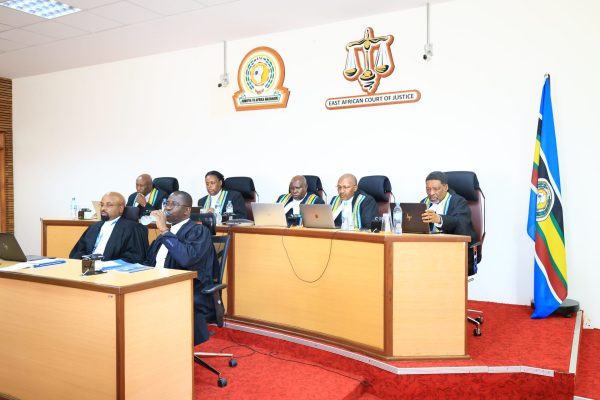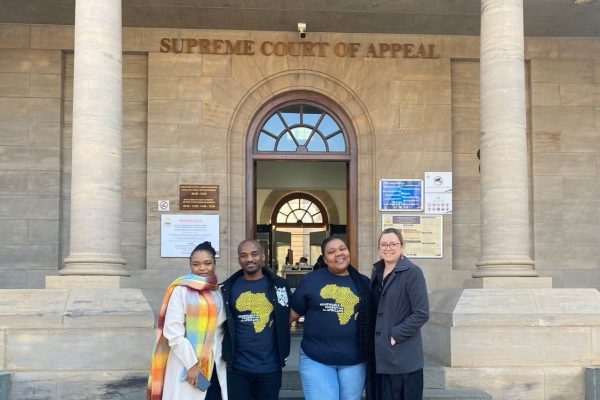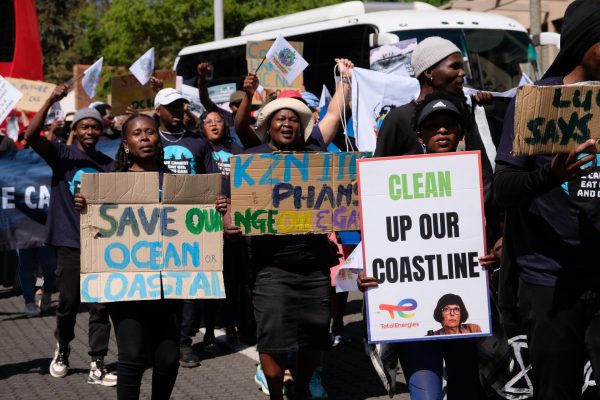In a landmark victory for civil society and coastal communities, the Western Cape High Court has set aside the South African government’s decision to grant environmental authorisation for offshore drilling in Block 5/6/7, along the South-West Coast. Judge Mangcu-Lockwood delivered her judgment on Wednesday, 13 August. Following an intense legal challenge by The Green Connection and Natural Justice that exposed serious flaws in how the environmental and social risks were evaluated, the court has now returned the matter to the Department of Minerals and Petroleum, requiring fresh assessments, additional information, and public participation. While the authorisation was initially granted to TotalEnergies EP South Africa (Teepsa), Total intends to transfer the environmental authorisation to Shell, for Shell to conduct the drilling.
Shahil Singh, Legal Advisor to The Green Connection, said the court found the Environmental Impact Assessment (EIA) failed to fully examine the consequences of a major oil spill on local and neighbouring coastal communities, ignored coastal protection laws, and omitted critical climate and fairness considerations. “A critical omission, the Oil Spill and Blowout Contingency Plans were withheld from the public until after approval, denying communities the chance to comment on emergency preparedness. Total and Shell will now need to undertake additional studies, make these plans publicly available, and properly assess both coastal and cross-border risks before any decision is taken. This is a significant win for transparency, precaution, and for the rights of coastal communities and small-scale fishers who refuse to be sidelined in decisions that affect their livelihoods and the future of our oceans,” says Singh.
The Green Connection’s Strategic Lead, Liziwe McDaid says that this case is an important victory for all South Africans and even our neighbours who may be affected because it sends a clear message about what should be expected when a proposed project carries serious environmental and social risks. “Our country’s laws demand full, open, and honest assessment, not partial studies, not secrecy, and not ignoring inconvenient truths. For the West Coast’s small-scale fishers, tourism operators, and coastal residents, it means the law is on their side in demanding protection of the ocean they depend on. For the public, it shows that environmental rights, including the right to have the environment protected for present and future generations, have real force in court. And for our neighbours, it means that the transboundary impacts of the project must be assessed.”
Natural Justice, Defending Rights Programme Manager, Melissa Groenink-Groves says, “This judgment is a victory in the growing opposition to oil and gas exploration in our country. Recently, a number of oil and gas projects have been given Environmental Authorisation, but this judgment again confirms that companies must follow due process, undertake comprehensive assessments and provide communities with an opportunity to have their voices heard, in respect of all relevant information. It confirms that our fight for our environmental rights is strong, and that we must continue for the future for our children.
Where necessary, we will continue to turn to our courts to not only stop the takers who parade under the guise of growth and development, but to ensure that impacts of oil and gas exploration and production are properly scrutinised and that our people and our resources are not exploited.”
In addition to setting aside the environmental authorisation, the court ordered that a fresh decision be made. Before any approval can be reconsidered, Total must submit new or amended assessments that fully examine the socio-economic impacts of a well blowout on coastal communities, the project’s full lifecycle climate impacts, all factors required under the Integrated Coastal Management Act, potential cross-border impacts on Namibia, and detailed oil spill response plans. The new information must also be subject to public consultation before a decision is taken.
Director at Cullinan & Associates, Lesai Seema says, “We welcome this judgment which builds on the landmark judgments in the litigation to stop Shell conducting seismic surveys off the Wild Coast and aligns South African law with international law. The judgment makes it clear that the granting of an environmental authorisation for offshore oil and gas exploitation will be unlawful if the decision-maker does not carefully consider a range of factors necessary to safeguard the long-term collective interests of people and other living organisms who depend on the coastal and marine environment.
The Cullinan’s team are proud to have represented Natural Justice and The Green Connection and are grateful to our outstanding team of advocates, Matthew Chaskalson SC, Ian Learmonth and Jane Blomkamp.”
TEEPSA 567 Summary:
A major legal victory for coastal communities and environmental rights
The High Court has set aside the South African government’s approval of TotalEnergies EP South Africa’s environmental authorisation to drill for oil and gas in offshore areas known as Block 5/6/7 along the South-West Coast. The court has sent the matter back to the Department of Minerals and Petroleum to make a fresh decision, following further studies, the addition of further information, and public participation.
This ruling is the result of a challenge brought by The Green Connection and Natural Justice, who argued that the approvals were given without properly considering the risks to the environment, people’s livelihoods, and South Africa’s climate commitments.
What the court found
The judge was clear: the process was deeply flawed.
Five major failures stood out:
1. No proper study of what a disaster would mean for communities
While the project’s Environmental Impact Assessment admitted that a blowout or oil spill could cause serious damage to the coastal environment, it did not assess the full economic and social impacts on the small-scale fishers and coastal communities who depend on these waters for food and income.
To the extent that there are limitations in conducting assessments, the court found that a cautious approach must be taken, and that a lack of scientific certainty could not be used as a reason for postponing measures to prevent environmental degradation.
2. Ignoring coastal protection laws
The project lies in South Africa’s exclusive economic zone, in waters which are considered to be “coastal public property”. The National Environmental Management: Integrated Coastal Management Act confers a special legal status on coastal public property, affording the environment a higher level of protection. It requires that decision-makers pay special attention to additional factors when taking decisions which affect the coastal environment. The court found that these factors were not considered by the decision-makers.
3. Climate change impacts not properly assessed
A key part of environmental impact assessment processes is the determination of the need for and desirability of the project. The court confirmed that the assessment of climate change impacts should form part of this assessment, It also confirmed that because oil and gas exploration and production (commercial exploitation) activities are intertwined, it makes no sense to rely on positive benefits of production, but not the negative climate change consequences, as Total had done.
4. No assessment of cross-border harm
The ocean doesn’t recognise national borders. Scientific spill modelling for the project showed that oil from a disaster could reach the waters and shores of Namibia. International law, and South Africa’s own laws, require that the impacts on our neighbouring countries should be considered, and that there was an obligation for the environmental impact assessment to consider the harms caused by transboundary impacts, and for this to be considered by the decision-makers. The court found they simply did not.
5. The public was kept in the dark on key emergency plans
Two critical documents, the Oil Spill Contingency Plan and the Blowout Contingency Plan, were not made public before approval. These documents describe how Total intends to modify, remedy, control or stop an oil spill resulting from a well blow-out. This meant interested and affected parties, including communities who would be most impacted in the event of an oil spill, could not comment on how the company planned to respond to a disaster. The court found that the lack of this information meant that there had not been a full assessment and description of the manner in which Total intends to respond to pollution or environmental degradation, as required by the National Environmental Management Act. The court found it even more problematic that there was no public participation in relation to the response plans.
What the court ordered
As a result, the decision to grant the environmental authorisation was set aside, and a new decision must be taken.
Total (or Shell) will be afforded an opportunity to submit new or amended assessments, which must:
- assess the socio-economic impacts of a well blow-out on coastal communities;
- assess the full lifecycle climate impacts associated with the exploration and exploitation;
- assess each of the factors required in the Integrated Coastal Management Act;
- assess the transboundary impacts of the project on Namibia; and
- include detailed oil spill response plans.
The new information must also be subject to public consultation before a decision is taken.
Why this matters for everyone
This case is about far more than just one drilling project.
The judgment sends a clear message:
- If a project carries serious environmental and social risks, our laws demand full, open, and honest assessment, not partial studies, not secrecy, and not ignoring inconvenient truths.
- For the West Coast’s small-scale fishers, tourism operators, and coastal residents, it means the law is on their side in demanding protection of the ocean they depend on. For the public, it shows that environmental rights, including the right to have the environment protected for present and future generations, have real force in court.
- This is a win for precaution, for transparency, and for the communities who refuse to be sidelined in decisions that affect their livelihoods and the future of our oceans.
Read the full judgment below:







